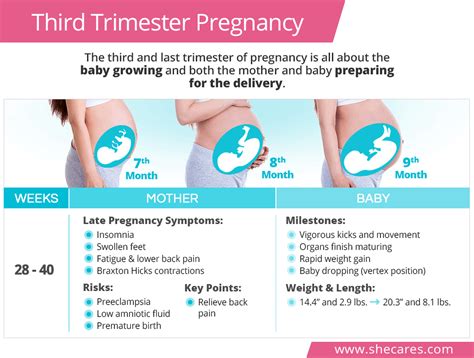Intro
Discover 7 essential tips for a smooth third trimester, covering pregnancy comfort, baby preparation, and labor readiness, to ensure a healthy and happy final stretch of pregnancy.
As the third trimester of pregnancy approaches, many expectant mothers start to feel a mix of emotions - excitement, anxiety, and anticipation. This period, which spans from week 28 to birth, is crucial for the baby's growth and development. It's essential for mothers-to-be to take extra care of themselves to ensure a healthy pregnancy and a smooth delivery. In this article, we will delve into the world of third-trimester pregnancy, exploring the challenges, benefits, and tips for a successful journey.
The third trimester is a time of significant growth for the baby, and the mother's body undergoes numerous changes to accommodate this growth. The baby's lungs start to mature, and they begin to prepare for life outside the womb. The mother's body, on the other hand, experiences a surge in hormone production, which can lead to various physical and emotional changes. Understanding these changes and taking proactive steps can help expectant mothers navigate this critical period with confidence.
As the due date draws near, it's natural for expectant mothers to feel a sense of anticipation and excitement. The third trimester is a time of preparation, not just for the baby's arrival but also for the mother's transition into parenthood. It's essential to prioritize self-care, build a support network, and stay informed about the pregnancy and childbirth process. By doing so, mothers-to-be can ensure a positive and empowering experience, setting themselves up for success in the years to come.
Third Trimester Overview

Physical Changes During the Third Trimester
The third trimester is characterized by various physical changes, including: * Weight gain: Expectant mothers can expect to gain around 10-15 pounds during the third trimester. * Back pain: The growing uterus can put pressure on the back, leading to discomfort and pain. * Braxton Hicks contractions: Mild contractions that prepare the uterus for labor. * Swollen feet and ankles: Fluid retention and pressure on the veins can cause swelling in the feet and ankles. * Breast tenderness: Hormonal changes can lead to breast tenderness and preparation for milk production.7 Tips for a Successful Third Trimester

Benefits of a Healthy Third Trimester
A healthy third trimester can have numerous benefits for both the mother and the baby, including: * Reduced risk of complications during childbirth * Improved fetal development and growth * Enhanced maternal physical and mental well-being * Increased confidence and preparedness for parenthood * A smoother transition into motherhoodManaging Common Third Trimester Challenges

Importance of Prenatal Care
Regular prenatal care is essential during the third trimester. It allows your healthcare provider to: * Monitor the baby's growth and development * Check for any potential complications or issues * Provide guidance on pregnancy, childbirth, and parenthood * Support your physical and emotional well-beingPreparing for Childbirth and Parenthood

Emotional Preparation for Motherhood
Becoming a mother can be a life-changing experience, and it's essential to prepare emotionally for this transition. Some ways to do this include: * Reflecting on your values, goals, and priorities as a mother * Connecting with other mothers or expectant mothers for support and guidance * Practicing self-care and stress reduction techniques * Building a strong support network of loved ones and friendsConclusion and Next Steps

We invite you to share your thoughts, questions, and experiences in the comments below. Whether you're an expectant mother or a seasoned parent, your insights can help others navigate this critical period. Let's build a supportive community that celebrates the journey of motherhood and provides valuable resources for those who need them.
What are the most common symptoms of the third trimester?
+The most common symptoms of the third trimester include back pain, swelling, breast tenderness, and Braxton Hicks contractions.
How can I manage back pain during the third trimester?
+To manage back pain during the third trimester, practice good posture, take regular breaks to rest, and engage in gentle exercises like prenatal yoga or swimming.
What are the benefits of attending prenatal classes?
+Attending prenatal classes can provide expectant mothers with valuable information about childbirth, parenting, and baby care, as well as an opportunity to connect with other expectant mothers and build a support network.
